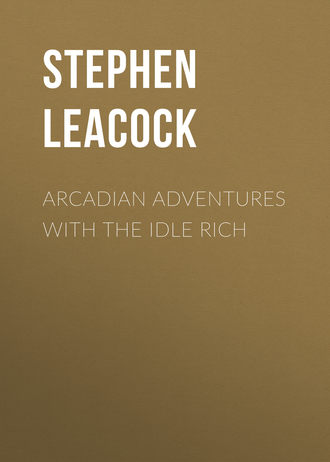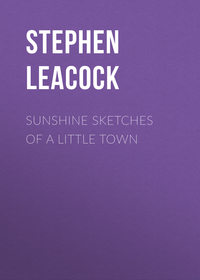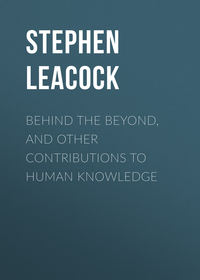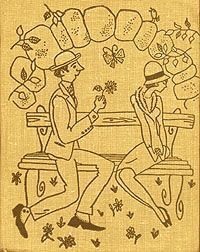 полная версия
полная версияArcadian Adventures with the Idle Rich
"Yes, Mr. Tomlinson," said the president, as they emerged from the building, "no doubt you begin to realize our unhappy position. Money, money, money," he repeated half-musingly. "If I had the money I'd have that whole building down and dismantled in a fortnight."
From the central building the three passed to the museum building, where Tomlinson was shown a vast skeleton of a Diplodocus Maximus, and was specially warned not to confuse it with the Dinosaurus Perfectus, whose bones, however, could be bought if anyone, any man of large heart; would come to the university and say straight out, "Gentlemen, what can I do for you?" Better still, it appeared the whole museum which was hopelessly antiquated, being twenty-five years old, could be entirely knocked down if a sufficient sum was forthcoming; and its curator, who was as ancient as the Dinosaurus itself, could be dismissed on half-pay if any man had a heart large enough for the dismissal.
From the museum they passed to the library, where there were full-length portraits of more founders and benefactors in long red robes, holding scrolls of paper, and others sitting holding pens and writing on parchment, with a Greek temple and a thunderstorm in the background.
And here again it appeared that the crying need of the moment was for someone to come to the university and say, "Gentlemen, what can I do for you?" On which the whole library, for it was twenty years old and out of date, might be blown up with dynamite and carted away.
But at all this the hopes of Tomlinson sank lower and lower. The red robes and the scrolls were too much for him.
From the library they passed to the tall buildings that housed the faculty of industrial and mechanical science. And here again the same pitiful lack of money was everywhere apparent. For example, in the physical science department there was a mass of apparatus for which the university was unable to afford suitable premises, and in the chemical department there were vast premises for which the university was unable to buy apparatus, and so on. Indeed it was part of Dr. Boomer's method to get himself endowed first with premises too big for the apparatus, and then by appealing to public spirit to call for enough apparatus to more than fill the premises, by means of which system industrial science at Plutoria University advanced with increasing and gigantic strides.
But most of all, the electric department interested the Wizard of Finance. And this time his voice lost its hesitating tone and he looked straight at Dr. Boomer as he began,
"I have a boy—"
"Ah!" said Dr. Boomer, with a huge ejaculation of surprise and relief; "you have a boy!"
There were volumes in his tone. What it meant was, "Now, indeed, we have got you where we want you," and he exchanged a meaning look with the professor of Greek.
Within five minutes the president and Tomlinson and Dr. Boyster were gravely discussing on what terms and in what way Fred might be admitted to study in the faculty of industrial science. The president, on learning that Fred had put in four years in Cahoga County Section No. 3 School, and had been head of his class in ciphering, nodded his head gravely and said it would simply be a matter of a pro tanto; that, in fact, he felt sure that Fred might be admitted ad eundem. But the real condition on which they meant to admit him was, of course, not mentioned.
One door only in the faculty of industrial and mechanical science they did not pass, a heavy oak door at the end of a corridor bearing the painted inscription: Geological and Metallurgical Laboratories. Stuck in the door was a card with the words (they were conceived in the courteous phrases of mechanical science, which is almost a branch of business in the real sense): Busy—keep out.
Dr. Boomer looked at the card. "Ah, yes," he said. "Gildas is no doubt busy with his tests. We won't disturb him." The president was always proud to find a professor busy; it looked well.
But if Dr. Boomer had known what was going on behind the oaken door of the Department of Geology and Metallurgy, he would have felt considerably disturbed himself.
For here again Gildas, senior professor of geology, was working among his blue flames at a final test on which depended the fate of the Erie Auriferous Consolidated and all connected with it.
Before him there were some twenty or thirty packets of crumpled dust and splintered ore that glittered on the testing-table. It had been taken up from the creek along its whole length, at even spaces twenty yards apart, by an expert sent down in haste by the directorate, after Gildas's second report, and heavily bribed to keep his mouth shut.
And as Professor Gildas stood and worked at the samples and tied them up after analysis in little white cardboard boxes, he marked each one very carefully and neatly with the words, PYRITES: WORTHLESS.
Beside the professor worked a young demonstrator of last year's graduation class. It was he, in fact, who had written the polite notice on the card.
"What is the stuff, anyway?" he asked.
"A sulphuret of iron," said the professor, "or iron pyrites. In colour and appearance it is practically identical with gold. Indeed, in all ages," he went on, dropping at once into the classroom tone and adopting the professional habit of jumping backwards twenty centuries in order to explain anything properly, "it has been readily mistaken for the precious metal. The ancients called it 'fool's gold.' Martin Frobisher brought back four shiploads of it from Baffin Land thinking that he had discovered an Eldorado. There are large deposits of it in the mines of Cornwall, and it is just possible," here the professor measured his words as if speaking of something that he wouldn't promise, "that the Cassiterides of the Phoenicians contained deposits of the same sulphuret. Indeed, I defy anyone," he continued, for he was piqued in his scientific pride, "to distinguish it from gold without a laboratory-test. In large quantities, I concede, its lack of weight would betray it to a trained hand, but without testing its solubility in nitric acid, or the fact of its burning with a blue flame under the blow-pipe, it cannot be detected. In short, when crystallized in dodecahedrons—"
"Is it any good?" broke in the demonstrator.
"Good?" said the professor. "Oh, you mean commercially? Not in the slightest. Much less valuable than, let us say, ordinary mud or clay. In fact, it is absolutely good for nothing."
They were silent for a moment, watching the blue flames above the brazier.
Then Gildas spoke again. "Oddly enough," he said, "the first set of samples were undoubtedly pure gold—not the faintest doubt of that. That is the really interesting part of the matter. These gentlemen concerned in the enterprise will, of course, lose their money, and I shall therefore decline to accept the very handsome fee which they had offered me for my services. But the main feature, the real point of interest in this matter remains. Here we have undoubtedly a sporadic deposit—what miners call a pocket—of pure gold in a Devonian formation of the post-tertiary period. This once established, we must revise our entire theory of the distribution of igneous and aqueous rocks. In fact, I am already getting notes together for a paper for the Pan-Geological under the heading, Auriferous Excretions in the Devonian Strata: a Working Hypothesis. I hope to read it at the next meeting."
The young demonstrator looked at the professor with one eye half-closed.
"I don't think I would if I were you." he said.
Now this young demonstrator knew nothing or practically nothing, of geology, because he came of one of the richest and best families in town and didn't need to. But he was a smart young man, dressed in the latest fashion with brown boots and a crosswise tie, and he knew more about money and business and the stock exchange in five minutes than Professor Gildas in his whole existence.
"Why not?" said the professor.
"Why, don't you see what's happened?"
"Eh?" said Gildas.
"What happened to those first samples? When that bunch got interested and planned to float the company? Don't you see? Somebody salted them on you."
"Salted them on me?" repeated the professor, mystified.
"Yes, salted them. Somebody got wise to what they were and swopped them on you for the real thing, so as to get your certified report that the stuff was gold."
"I begin to see," muttered the professor. "Somebody exchanged the samples, some person no doubt desirous of establishing the theory that a sporadic outcropping of the sort might be found in a post-tertiary formation. I see, I see. No doubt he intended to prepare a paper on it, and prove his thesis by these tests. I see it all!"
The demonstrator looked at the professor with a sort of pity.
"You're on!" he said, and he laughed softly to himself.
"Well," said Dr. Boomer, after Tomlinson had left the university, "what do you make of him?" The president had taken Dr. Boyster over to his house beside the campus, and there in his study had given him a cigar as big as a rope and taken another himself. This was a sign that Dr. Boomer wanted Dr. Boyster's opinion in plain English, without any Latin about it.
"Remarkable man," said the professor of Greek; "wonderful penetration, and a man of very few words. Of course his game is clear enough?"
"Entirely so," asserted Dr. Boomer.
"It's clear enough that he means to give the money on two conditions."
"Exactly," said the president.
"First that we admit his son, who is quite unqualified, to the senior studies in electrical science, and second that we grant him the degree of Doctor of Letters. Those are his terms." "Can we meet them?"
"Oh, certainly. As to the son, there is no difficulty, of course; as to the degree, it's only a question of getting the faculty to vote it. I think we can manage it."
Vote it they did that very afternoon. True, if the members of the faculty had known the things that were being whispered, and more than whispered, in the City about Tomlinson and his fortune, no degree would ever have been conferred on him. But it so happened that at that moment the whole professoriate was absorbed in one of those great educational crises which from time to time shake a university to its base. The meeting of the faculty that day bid fair to lose all vestige of decorum in the excitement of the moment. For, as Dean Elderberry Foible, the head of the faculty, said, the motion that they had before them amounted practically to a revolution. The proposal was nothing less than the permission of the use of lead-pencils instead of pen and ink in the sessional examinations of the university. Anyone conversant with the inner life of a college will realize that to many of the professoriate this was nothing less than a last wild onslaught of socialistic democracy against the solid bulwarks of society. They must fight it back or die on the walls. To others it was one more step in the splendid progress of democratic education, comparable only to such epoch-making things as the abandonment of the cap and gown, and the omission of the word "sir" in speaking to a professor.
No wonder that the fight raged. Elderberry Foible, his fluffed white hair almost on end, beat in vain with his gavel for order. Finally, Chang of Physiology, who was a perfect dynamo of energy and was known frequently to work for three or four hours at a stretch, proposed that the faculty should adjourn the question and meet for its further discussion on the following Saturday morning. This revolutionary suggestion, involving work on Saturday, reduced the meeting to a mere turmoil, in the midst of which Elderberry Foible proposed that the whole question of the use of lead-pencils should be adjourned till that day six months, and that meantime a new special committee of seventeen professors, with power to add to their number, to call witnesses and, if need be, to hear them, should report on the entire matter de novo. This motion, after the striking out of the words de novo and the insertion of ab initio, was finally carried, after which the faculty sank back completely exhausted into its chair, the need of afternoon tea and toast stamped on every face.
And it was at this moment that President Boomer, who understood faculties as few men have done, quietly entered the room, laid his silk hat on a volume of Demosthenes, and proposed the vote of a degree of Doctor of Letters for Edward Tomlinson. He said that there was no need to remind the faculty of Tomlinson's services to the nation; they knew them. Of the members of the faculty, indeed, some thought that he meant the Tomlinson who wrote the famous monologue on the Iota Subscript, while others supposed that he referred to the celebrated philosopher Tomlinson, whose new book on the Indivisibility of the Inseparable was just then maddening the entire world. In any case, they voted the degree without a word, still faint with exhaustion.
But while the university was conferring on Tomlinson the degree of Doctor of Letters, all over the City in business circles they were conferring on him far other titles. "Idiot," "Scoundrel," "Swindler," were the least of them. Every stock and share with which his name was known to be connected was coming down with a run, wiping out the accumulated profits of the Wizard at the rate of a thousand dollars a minute.
They not only questioned his honesty, but they went further and questioned his business capacity.
"The man," said Mr. Lucullus Fyshe, sitting in the Mausoleum Club and breathing freely at last after having disposed of all his holdings in the Erie Auriferous, "is an ignoramus. I asked him only the other day, quite casually, a perfectly simple business question. I said to him. 'T.C. Bonds have risen twenty-two and a half in a week. You know and I know that they are only collateral trust, and that the stock underneath never could and never would earn a par dividend. Now,' I said, for I wanted to test the fellow, 'tell me what that means?' Would you believe me, he looked me right in the face in that stupid way of his, and he said, 'I don't know!'"
"He said he didn't know!" repeated the listener contemptuously; "the man is a damn fool!"
The reason of all this was that the results of the researches of the professor of geology were being whispered among the directorate of the Erie Auriferous. And the directors and chief shareholders were busily performing the interesting process called unloading. Nor did ever a farmer of Cahoga County in haying time with a thunderstorm threatening, unload with greater rapidity than did the major shareholders of the Auriferous. Mr. Lucullus Fyshe traded off a quarter of his stock to an unwary member of the Mausoleum Club at a drop of thirty per cent, and being too prudent to hold the rest on any terms, he conveyed it at once as a benefaction in trust to the Plutorian Orphans' and Foundlings' Home; while the purchaser of Mr. Fyshe's stock, learning too late of his folly, rushed for his lawyers to have the shares conveyed as a gift to the Home for Incurables.
Mr. Asmodeus Boulder transferred his entire holdings to the Imbeciles' Relief Society, and Mr. Furlong, senior, passed his over to a Chinese mission as fast as pen could traverse paper.
Down at the office of Skinyer and Beatem, the lawyers of the company, they were working overtime drawing up deeds and conveyances and trusts in perpetuity, with hardly time to put them into typewriting. Within twenty-four hours the entire stock of the company bid fair to be in the hands of Idiots, Orphans, Protestants, Foundlings, Imbeciles, Missionaries, Chinese, and other unfinancial people, with Tomlinson the Wizard of Finance as the senior shareholder and majority control. And whether the gentle Wizard, as he sat with mother planning his vast benefaction to Plutoria University, would have felt more at home with his new group of fellow-shareholders than his old, it were hard to say.
But, meantime, at the office of Skinyer and Beatem all was activity. For not only were they drafting the conveyances of the perpetual trusts as fast as legal brains working overtime could do it, but in another part of the office a section of the firm were busily making their preparations against the expected actions for fraud and warrants of distraint and injunctions against disposal of assets and the whole battery of artillery which might open on them at any moment. And they worked like a corps of military engineers fortifying an escarpment, with the joy of battle in their faces.
The storm might break at any moment. Already at the office of the Financial Undertone the type was set for a special extra with a heading three inches high:
COLLAPSEOF THE ERIE CONSOLIDATEDARREST OF THE MAN TOMLINSONEXPECTED THIS AFTERNOONSkinyer and Beatem had paid the editor, who was crooked, two thousand dollars cash to hold back that extra for twenty-four hours; and the editor had paid the reporting staff, who were crooked, twenty-five dollars each to keep the news quiet, and the compositors, who were also crooked, ten dollars per man to hold their mouths shut till the morning, with the result that from editors and sub-editors and reporters and compositors the news went seething forth in a flood that the Erie Auriferous Consolidated was going to shatter into fragments like the bursting of a dynamite bomb. It rushed with a thousand whispering tongues from street to street till it filled the corridors of the law courts and the lobbies of the offices, and till every honest man that held a share of the stock shivered in his tracks and reached out to give, sell, or destroy it. Only the unwinking Idiots, and the mild Orphans, and the calm Deaf mutes and the impassive Chinese held tight to what they had. So gathered the storm, till all the town, like the great rotunda of the Grand Palaver, was filled with a silent "call for Mr. Tomlinson," voiceless and ominous.
And while all this was happening, and while at Skinyer and Beatem's they worked with frantic pens and clattering type there came a knock at the door, hesitant and uncertain, and before the eyes of the astounded office there stood in his wide-awake hat and long black coat the figure of "the man Tomlinson" himself.
And Skinyer, the senior partner, no sooner heard what Tomlinson wanted than he dashed across the outer office to his partner's room with his hyena face all excitement as he said:
"Beatem, Beatem, come over to my room. This man is absolutely the biggest thing in America. For sheer calmness and nerve I never heard of anything to approach him. What do you think he wants to do?"
"What?" said Beatem.
"Why, he's giving his entire fortune to the university."
"By Gad!" ejaculated Beatem, and the two lawyers looked at one another, lost in admiration of the marvellous genius and assurance of Tomlinson.
Yet what had happened was very simple.
Tomlinson had come back from the university filled with mingled hope and hesitation. The university, he saw, needed the money and he hoped to give it his entire fortune, to put Dr. Boomer in a position to practically destroy the whole place. But, like many a modest man, he lacked the assurance to speak out. He felt that up to the present the benefactors of the university had been men of an entirely different class from himself. It was mother who solved the situation for him.
"Well, father," she said, "there's one thing I've learned already since we've had money. If you want to get a thing done you can always find people to do it for you if you pay them. Why not go to those lawyers that manage things for the company and get them to arrange it all for you with the college?"
As a result, Tomlinson had turned up at the door of the Skinyer and Beatem office.
"Quite so, Mr. Tomlinson," said Skinyer, with his pen already dipped in the ink, "a perfectly simple matter. I can draw up a draft of conveyance with a few strokes of the pen. In fact, we can do it on the spot."
What he meant was, "In fact, we can do it so fast that I can pocket a fee of five hundred dollars right here and now while you have the money to pay me."
"Now then," he continued, "let us see how it is to run."
"Well," said Tomlinson, "I want you to put it that I give all my stock in the company to the university."
"All of it?" said Skinyer, with a quiet smile to Beatem.
"Every cent of it, sir," said Tomlinson; "just write down that I give all of it to the college."
"Very good," said Skinyer, and he began to write, "I, so-and-so, and so-and-so, of the county of so-and-so—Cahoga, I think you said, Mr. Tomlinson?"
"Yes, sir," said the Wizard, "I was raised there."
"—do hereby give, assign, devise, transfer, and the transfer is hereby given, devised and assigned, all those stocks, shares, hereditaments, etc., which I hold in the etc., etc., all, several and whatever—you will observe, Mr. Tomlinson, I am expressing myself with as great brevity as possible—to that institution, academy, college, school, university, now known and reputed to be Plutoria University, of the city of etc., etc."
He paused a moment. "Now what special objects or purposes shall I indicate?" he asked.
Whereupon Tomlinson explained as best he could, and Skinyer, working with great rapidity, indicated that the benefaction was to include a Demolition Fund for the removal of buildings, a Retirement Fund for the removal of professors, an Apparatus Fund for the destruction of apparatus, and a General Sinking Fund for the obliteration of anything not otherwise mentioned.
"And I'd like to do something, if I could, for Mr. Boomer himself, just as man to man," said Tomlinson.
"All right," said Beatem, and he could hardly keep his face straight. "Give him a chunk of the stock—give him half a million."
"I will," said Tomlinson; "he deserves it."
"Undoubtedly," said Mr. Skinyer.
And within a few minutes the whole transaction was done, and Tomlinson, filled with joy, was wringing the hands of Skinyer and Beatem, and telling them to name their own fee.
They had meant to, anyway.
"Is that legal, do you suppose?" said Beatem to Skinyer, after the Wizard had gone. "Will it hold water?"
"Oh, I don't think so," said Skinyer, "not for a minute. In fact, rather the other way. If they make an arrest for fraudulent flotation, this conveyance, I should think, would help to send him to the penitentiary. But I very much doubt if they can arrest him. Mind you, the fellow is devilish shrewd. You know, and I know that he planned this whole flotation with a full knowledge of the fraud. You and I know it—very good—but we know it more from our trained instinct in such things than by any proof. The fellow has managed to surround himself with such an air of good faith from start to finish that it will be deuced hard to get at him."
"What will he do now?" said Beatem.
"I tell you what he'll do. Mark my words. Within twenty-four hours he'll clear out and be out of the state, and if they want to get him they'll have to extradite. I tell you he's a man of extraordinary capacity. The rest of us are nowhere beside him."
In which, perhaps, there was some truth.
"Well, mother," said the Wizard, when he reached the thousand-dollar suite, after his interview with Skinyer and Beatem, his face irradiated with simple joy, "it's done. I've put the college now in a position it never was in before, nor any other college; the lawyers say so themselves."
"That's good," said mother.
"Yes, and it's a good thing I didn't lose the money when I tried to. You see, mother, what I hadn't realized was the good that could be done with all that money if a man put his heart into it. They can start in as soon as they like and tear down those buildings. My! but it's just wonderful what you can do with money. I'm glad I didn't lose it!"
So they talked far into the evening. That night they slept in an Aladdin's palace filled with golden fancies.
And in the morning the palace and all its visions fell tumbling about their heads in sudden and awful catastrophe. For with Tomlinson's first descent to the rotunda it broke. The whole great space seemed filled with the bulletins and the broadside sheets of the morning papers, the crowd surging to and fro buying the papers, men reading them as they stood, and everywhere in great letters there met his eye:
COLLAPSEOF THE ERIE AURIFEROUSTHE GREAT GOLD SWINDLEARREST OF THE MAN TOMLINSONEXPECTED THIS MORNINGSo stood the Wizard of Finance beside a pillar, the paper fluttering in his hand, his eyes fixed, while about him a thousand eager eyes and rushing tongues sent shame into his stricken heart.









